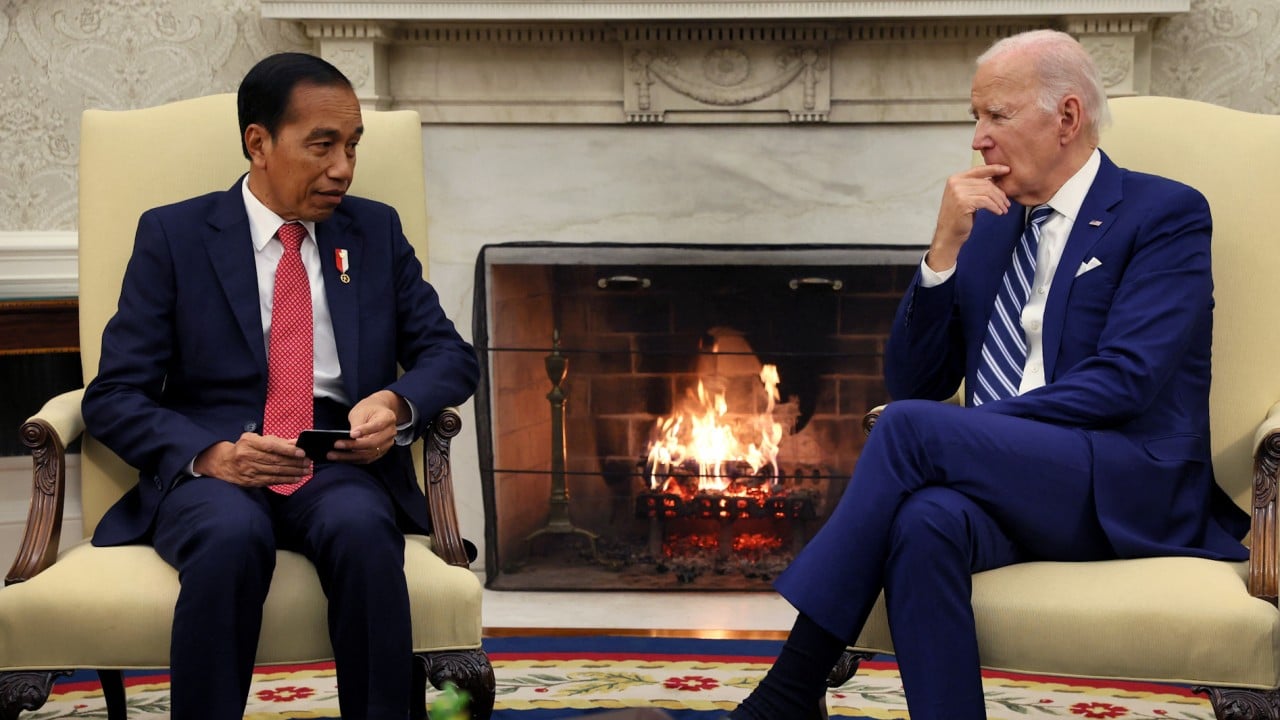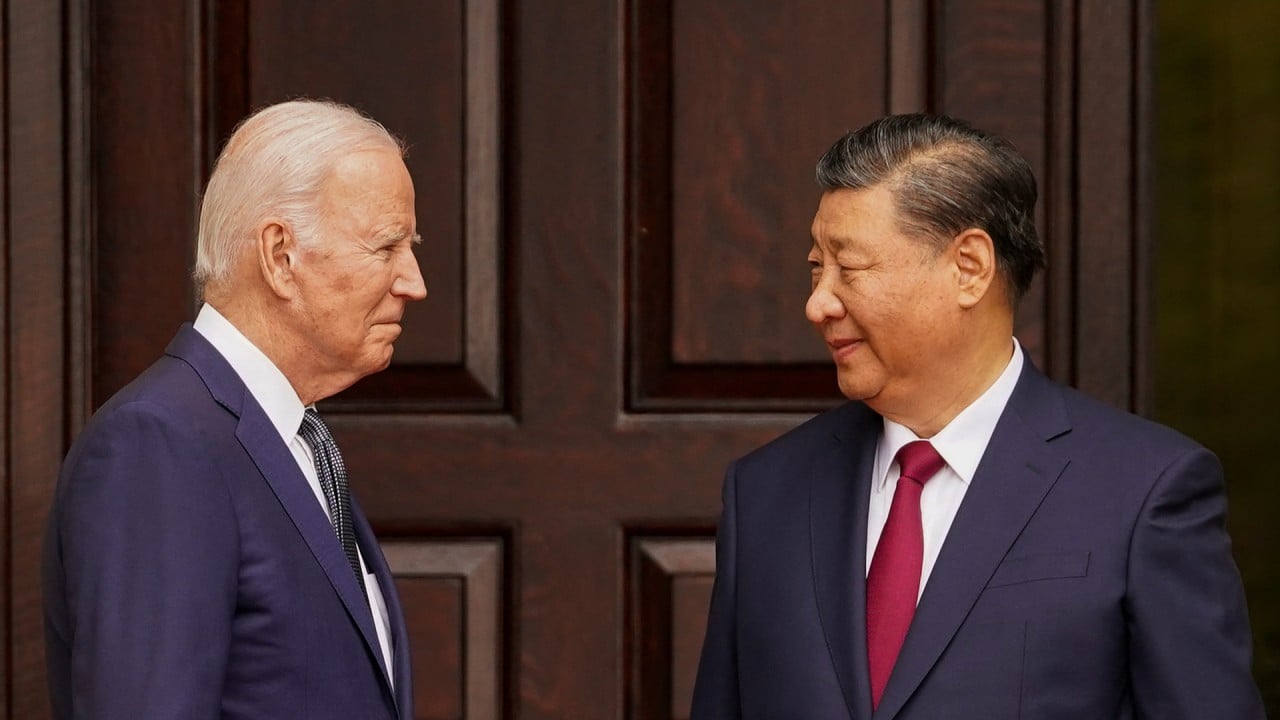Chinese stocks set unwanted records as 2023 losses stun market bulls
[ad_1]
About US$955 billion of market capitalisation has evaporated from Chinese stocks listed in Hong Kong, Shanghai, Shenzhen and New York this year, according to Bloomberg data. China analysts at Wall Street investment banks have had to scale back their targets on economic growth, corporate earnings and the yuan.
Alibaba Group, Meituan, JD.com and Ping An Insurance, some of the market heavyweights, have retreated by 10 to 52 per cent in Hong Kong, while the 700-odd members of the MSCI China Index tumbled 9 per cent to rank among the worst global benchmark indices.
At the heart of the debacle is a misjudgment of the strength of China’s post-Covid economic recovery and the efficacy of Beijing’s policy reactions. China’s drip-feed fiscal and monetary policies underwhelmed, and debt implosions at China Evergrande and Country Garden sapped confidence. The yuan’s slide to a 16-year low hurt returns, and is likely to resume and crimp expected returns, analysts said.

“It is nearly impossible to sell anyone China exposure this year,” Jason Hsu, founder and chairman of Rayliant Global Advisors, said by phone. The Los Angeles-based firm with about US$17 billion of assets under management. “The clients, who we run money for, are scared by the headlines.”
That fear could explain the record capital flight from China. Foreign investors have sold over 170 billion yuan (US$23.4 billion) worth of onshore stocks since end-July, according to Stock Connect data. Their ownership of Hong Kong-listed stocks fell to 37 per cent by September from roughly 44 per cent in early 2020, according to Daiwa Capital Markets.
The MSCI China Index has declined almost 10 per cent this year, following a 23.6 per cent drop in 2022 and 22.8 per cent in 2021. The last time it charted a three-year losing streak was in 2000-2002. Barring a major rally in Hong Kong, the Hang Seng Index is poised to log a fourth year of setback, unprecedented since its inception in 1969, according to Bloomberg data.
History puts China stocks at risk amid broken property market, Biden order
History puts China stocks at risk amid broken property market, Biden order
“It’s always hard to predict the markets, but people got it particularly wrong this year,” said Qi Wang, chief investment officer of UOB Kay Hian’s wealth management division in Hong Kong. “No one knew what was waiting for them.”
The narrative and sentiment on Chinese stocks could not have been more different 11 months ago. Chinese stocks were held up as the world’s best to own, after Beijing abandoned its zero-Covid policy to a chorus of approval and upgrades.
“We raise price targets and expect China to top global equity market performance in 2023,” analysts at Morgan Stanley said in a note in January. “We believe the market is under-appreciating the far-reaching ramifications of reopening, and the possibility that a robust cyclical recovery can occur despite lingering structural headwinds.”
“We forecast 10 per cent potential upside in MSCI China from now to end-2023,” analysts at JPMorgan said in a report in December last year. “Things should improve subsequently as consumer and business confidence gradually picks up. By late 2023, the market could be looking more optimistically toward growth recovery in 2024.”
China’s loss is Japan’s gain as investors turn to Asia’s other markets
China’s loss is Japan’s gain as investors turn to Asia’s other markets
Feng Shui Index: CLSA says stocks face three setbacks before November surge
Feng Shui Index: CLSA says stocks face three setbacks before November surge
The main issue is a matter of confidence, said Wang of UOB said. “It’s not about being pessimistic, but rather suggesting that everyone should be cautious.”
To be sure, policymakers in Beijing are doing something.
Stocks in the MSCI China Index recently traded at 11.8 times their forward 12-month earnings, compared with a five-year average multiple of 14.8 times, according to Bloomberg data. That low valuation is enticing for fund managers like Franklin Templeton, which oversees US$1.33 trillion of assets.
Valuation history signals China stock sell-off is ending, fund managers say
Valuation history signals China stock sell-off is ending, fund managers say
“What really excites us is the valuation,” Tariq Ahmad, Singapore-based head of Asia-Pacific at Templeton, said in an interview. “It’s exhibiting a lot of cheapness right now. It creates better entry points for us to capitalise on positions today for long-term growth.”
The market is oversold after relentless headlines about “Peak China” and “Is the China story over”, Terrence Gray, a portfolio manager at Lazard Asset Management in New York, said by email. With India trading at nearly three times the average emerging markets price-to-earnings ratio, China looks compelling, he added.
China bears have several reasons to continue staying out of the market for now.
For one, the yuan’s current stability appears fleeting. A hike in the domestic interbank offered rates to shore up the currency, just like previous episodes in 2016, 2018, 2019 and 2022, may not sustain given the damage to credit demand.
“In the long run, we are sceptical that authorities will sacrifice recovery to maintain a stable currency,” Arthur Budaghyan, chief China strategist at BCA Research in Montreal, said in a report on November 16. “Absolute-return investors should for now stay away from the Chinese offshore and onshore stock indexes.”
For another, a loss in confidence in private property developers is likely to ensure bond defaults stay in the spotlight.
China Evergrande: court adjourns winding-up hearing, signals last reprieve
China Evergrande: court adjourns winding-up hearing, signals last reprieve
“The funding crunch has barely eased despite repeated moral suasion from regulators,” said Yan Wang, China strategist at Montreal-based research firm Alpine Macro. “The bottom line is that the real estate sector remains a critical signpost to monitor China’s recovery, and so far there is no clear sign of bottoming.”
Yet, even domestic investors have turned cold on the market and need some convincing. Among companies traded in Shanghai and Shenzhen, earnings downgrades have outstripped upgrades by about four to one this year through November 10, according to Bank of America.
The US$6.8 billion Blue Chip Select, one the most popular funds managed by E Fund Management, has suffered redemptions by retail investors for three straight quarters. Its net assets have shrunk by more than 15 per cent this year.
Chinese stocks’ low valuations may be justified by structural deteriorations in the profitability of listed companies, BCA Research said. Profits at internet companies will be capped by regulators in pursuit of common prosperity, heralding a lower return on equity and price-earnings multiples.
“The hurdles to a sustainable China equity market recovery are still high, with mounting macro pressure on earnings coupled with currency weakness,” strategists at Morgan Stanley wrote in a November 12 report. The weight of China’s deteriorating demographics, property and local government debts, and global supply chain de-risking will be felt for years to come, Goldman added.
Without more aggressive policy reflation from Beijing and a decisive cyclical upturn, Chinese stocks are likely to remain highly jittery, despite deeply depressed valuations, said Alpine Macro’s Wang.
“It would be hard for the markets to turn around the hefty loss this year with only weeks left,” said Kenny Wen, head of investment strategy at KGI Asia in Hong Kong. “Confidence is something that really needs a lot of time to repair.”
[ad_2]
Read More:Chinese stocks set unwanted records as 2023 losses stun market bulls






Comments are closed.